
7.12 Algebra Readiness Formative Assessment
- Subject:
- Mathematics
- Material Type:
- Assessment
- Provider:
- VDOE
- Author:
- VDOE
- Date Added:
- 10/07/2024

7.12 Algebra Readiness Formative Assessment

Solve two step linear equations in one variable - Algebra Readiness Remediation Plan

Solve two-step and multistep equations - Algebra Readiness Remediation Plan

Solve Two-step Linear Equations in One Variable Formative Assessment - Just in Time Quick Check, Teacher Notes, and Supporting Resources

Solving one and two step linear equations - Mathematics Instructional Plan

Write verbal expressions and sentences as algebraic expressions and equations; write algebraic expressions and equations as verbal expressions and sentences - Mathematics Instructional Plan

Your friend asked you to enter a texting/typing competition but have months to practice. We know practicing something makes you better at it. You will be given your current speed and how well you improve over each month. It is your job to find your texting/typing speed given a number of months that you have practiced. You are also to look over other student’s work to see if they made an error and if so, where.
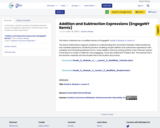
In this lesson, students practice translating between words and algebraic expressions. Students also draw models for these expressions.

In this lesson, students will be introduced to the idea of decomposition. Specifically the lesson caters to math word problems, but could be easily modified to any subject (as found in the modificaitons section of the lesson plan). Students will engage with each other and the vocab to work through an easy process to decompose word problems into manaeagable pieces as a strategy to solve. All activities are low prep and can be modified to your needs. This can be a stand alone lesson or expanded by using Part 2 and Part 3 to deepen understanding through coding activities.

This lesson expands upon the ideas of decomposition by using GameChangineer to incorporate commands to create a coded mini game from decomposing word problems. Students will assist the teacher in this guided lesson on how to create commands and use the website before engaing independently in Part 3. Activities are low prep with modifications included, but do require organized planning to implement effectively. If you have not done a lesson on decomposition, it is suggested you use Part 1 to help student's gain the necessary understandings of the processes used in this lesson.

7.12 Equations Co-Teaching MIP

In this Illustrative Math resource, students must transform expressions using the distributive, commutative and associative properties to decide which expressions are equivalent. The Virginia Department of Education extension activity titled, "Translate and Evaluate Expressions" directs students to represent verbal quantitative situations algebraically using a matching activity, graphic organizer, and teacher lesson plan.
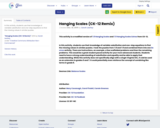
In this activity, students use their knowledge of variable substitution and one-step equations to find the missing values in similar puzzles.

This lesson has students modeling two step equations to solve word problems.
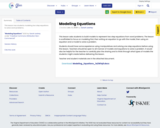
This lesson has students modeling two step equations to solve word problems.
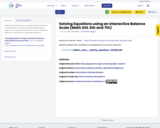
Explore what it means for a mathematical statement to be balanced or unbalanced by interacting with objects on a balance. Discover the rules for keeping it balanced. Collect stars by playing the game!

Solving one and two step linear equations.Mathematics Instructional Plans (MIPs) help teachers align instruction with the Mathematics Standards of Learning (SOL) by providing examples of how the knowledge, skills and processes found in the SOL and curriculum framework can be presented to students in the classroom.
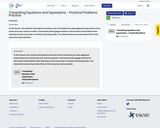
OverviewIn this lesson, the students will explore and learn how to translate two step algebraic expressions from words and real-world scenarios. The teacher will engage students in discussion and facilitate their learning as they encounter a variety of learning styles. The attached document provides links to the resources and materials.

OverviewIn this lesson, the students will explore and learn how to translate two step algebraic expressions from words and real-world scenarios. The teacher will engage students in discussion and facilitate their learning as they encounter a variety of learning styles. The attached document provides links to the resources and materials.

OverviewIn this lesson, the students will explore and learn how to translate two step algebraic expressions from words and real-world scenarios. The teacher will engage students in discussion and facilitate their learning as they encounter a variety of learning styles. The attached document provides links to the resources and materials.